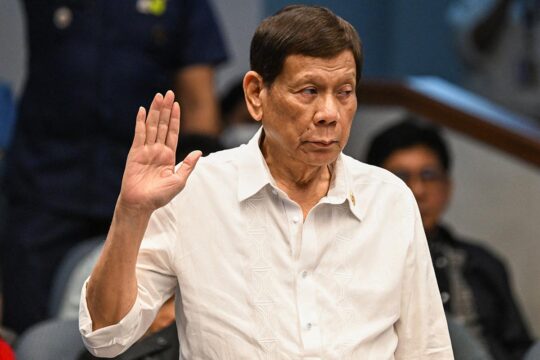The International Criminal Court and dozens of countries on Friday condemned sanctions imposed by US President Donald Trump over probes targeting America and Israel as a threat to "law based international order".
The United Nations and the European Union urged Trump to reverse the asset freezes and travel bans against ICC officials, employees and their families and anyone deemed to have helped ICC investigations.
US allies, including Britain, France and Canada, were among 79 of the 125 ICC member states who said the US action "could jeopardize" the safety of victims, witnesses and court officials.
Trump on Thursday signed an executive order saying that the court, which was founded in 2002 to investiate genocide, war crimes and crimes against humanity, had "abused its power" by issuing an arrest warrant for Israeli Prime Minister Benjamin Netanyahu, who held talks with the US president on Tuesday.
The ICC, which is based in The Hague, said the sanctions sought to "harm its independent and impartial judicial work". It vowed to stand "firmly" with staff "providing justice and hope to millions of innocent victims of atrocities across the world".
Court president Tomoko Akane said: "Such threats and coercive measures constitute serious attacks against the court's states parties, the rule of law based international order and millions of victims."
- 'Undermines' justice system -
The United Nations urged Trump to reverse the move.
"The court should be fully able to undertake its independent work," OHCHR UN human rights office spokeswoman Ravina Shamdasani said in an email statement.
"The rule of law remains essential to our collective peace and security. Seeking accountability globally makes the world a safer place for everyone."
Antonio Costa, who heads the European Council representing the EU's 27 member states, wrote on X that the move "undermines the international criminal justice system".
The European Commission expressed "regret" and stressed the ICC's "key importance in upholding international criminal justice and the fight against impunity".
The 79 ICC member countries said Trump's sanctions increased the "risk of impunity" for serious crimes and "threaten to erode the international rule of law".
That statement was led by Slovenia, Luxembourg, Mexico, Sierra Leone and Vanuatu but Brazil, Britain, Canada, France and Germany were among the signatories.
The court has pursued investigations in several conflict zones and Ukraine's foreign ministry spokesman Georgiy Tykhy was quick to express concern over the sanctions.
"We hope that they will not affect the court's ability to achieve justice for the victims of Russian aggression," he said. The Kremlin only reaffirmed that it does not recognise the ICC.
- ICC 'illegitimate': Trump -
The names of individuals affected by sanctions were not immediately released, but previous US sanctions under Trump targeted the court's prosecutor.
Trump's order said that the tribunal had engaged in "illegitimate and baseless actions targeting America and our close ally Israel", referring to ICC probes into alleged war crimes by US service members in Afghanistan and Israeli troops in Gaza.
Israel's foreign minister Gideon Saar strongly applauded Trump and called the court's actions against Israel "immoral" and without "legal basis".
Neither the United States nor Israel are members of the court.
Following a request by ICC prosecutor Karim Khan, judges issued arrest warrants on November 21 for Netanyahu, his former defence minister Yoav Gallant, and Hamas's military chief Mohammed Deif, who was killed last year.
The court said it had found "reasonable grounds" to believe Netanyahu and Gallant bore "criminal responsibility" for the war crime of starvation in Gaza, as well as crimes against humanity of murder, persecution, and other inhumane acts.
Netanyahu accused the court of anti-Semitism.
During his first term, Trump imposed financial sanctions and a visa ban on the ICC's then-prosecutor Fatou Bensouda, and other senior officials in 2020.
His administration acted after Bensouda launched an investigation into allegations of war crimes against US soldiers in Afghanistan. She opened a probe into events in the Palestinian territories in 2019.
Current prosecutor Khan later effectively dropped the US from the Afghan investigation and focused on the Taliban instead.
President Joe Biden lifted the US sanctions after taking office in 2021.
burs-tw/bc
X


